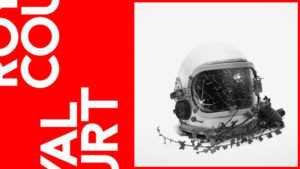Parama 2 Making it – LIVE!
A review of the programme of scripting workshops leading up to and including, the production: by a participant.
A small group of women of a certain age gather together in the curious spare rooms and spaces of the Wales Millennium Centre every Tuesday afternoon for 9 weeks.
March 15th
We introduce ourselves cautiously to our facilitators, Valmai Jones and Catrin Edwards; and to each other. Why are we here? Personal growth and development, honing skills and learning new ones, changing paths, making connections. A mixed bag of skills too–clowning, illustrating, writing, performing, acting – and a fair few years of life experience to boot. We watch Catrin’s film, Voices From the Factory Floor, with extra voices from the WMC breast cancer charity fashion show below. A heady mixture of women’s words on a Tuesday afternoon.
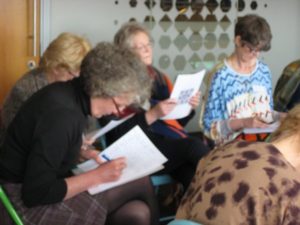
Responding to the characters in the film seems easier to some than others. Some slip into roles easily; others struggle a little; I have no idea how to pretend and can only be me. I am astonished at the ease with which our group brings life and animation and speech to these women we have only glimpsed, sometimes second or even third hand. Real stories slip out so naturally hidden in the make-believe.
Now, Val employs a little trick each week. Relaxation exercises for the body and the brain with closed eyes. Her mellifluous Welsh lilt calms our nervous spirits and revives our inner creativity. Staring intensely at paper mandalas to free up our right brains – mind over myth – becomes part of our shared experiences, part of bonding the group and comforts changes with consistency. This is neat.
We play a kind of Consequences – throw our titles into a hat, pick one, write some lines, pass it on… we read them out – remarkably adept little stories, tight, funny, sad, clever but mostly text, not so much dialogue.
As the weeks roll on, we learned to examine characters and how to bring them to life through words and play. We had homework: write up your character – give her life. Give her words to say. And playlets form with monologues, dialogues, complex scenarios. Characters cry, laugh, shout and dance. Some of us stay with the themes of the film; some use the Consequences storylines; others choose something new. Somehow, perhaps not surprisingly, we all talk about the influential women n our lives.
I struggle with reading out my words, my dialogue. And the first time it matters, I can’t do it. I am ten years old and I will be humiliated. I hand my script to Val. She is so kind and talks me through ideas and scenarios and builds my confidence.
The call goes out – posters are ready, the time and date is set – we will be performing at 3pm on the 9th May in the Preseli Rooms at the WMC. Tell your friends and families.
I write a script over an evening. I have been mulling over the idea for a few weeks now without realising. I cannot face reading it. I wonder how the others are managing.
May 8th
Rehearsals. It is a beautiful, hot sunny day outside and we are all inside, fretting over scripts, tripping over stage hands and working with professional actors. This is getting very real. We are called to the stage, Val is acting and Catrin is directing. We are multi-tasking at a superhuman level.
I cannot open my eyes when they start to read my play. Gradually, I uncurl and watch and listen and begin to edit and critique and love it. Not love my work – but love the process. I discover acting is a joy – to be someone else for someone else is a privilege. I try so hard to do it as well as I can. Everyone else seems so much better at this but inside, I guess, we all feel the nervous.
May 9th, 3pm
Somehow, out of all the chaos, a slick series of plays is presented to a small but hugely appreciative audience. All credit to Catrin and Val for their inspiration and facilitation. All credit to the actors and stage hands for adding that professional edge.
And to us? Well. We pulled it off.
The audience, mostly made up of women from Voices from the Factory Floor, has enjoyed our efforts very much. The plays remind them of conversations had with their own mothers, fathers, daughters and friends. One said that we hadn’t needed scripts to read – that we could have just chatted amongst ourselves on stage – and there I see the compliment, our work was natural, candid observation with each of us adding our own personalities and quirks to tell tales. Not perfect but gentle, the work of women who have been there.
I am not alone in being relieved yet ecstatic as the event closes but oh so sorry that this series of workshops is not continuing and that we are left to go our own ways with our words.
The project was supported by Age Cymru’s Gwanwyn Festival which is funded by Welsh Government and Arts Council of Wales, WI in Wales and Women’s Archive of Wales
http://gwanwyn.org.uk/events/making-it-free-drama-scripting-workshop-for-older-women/

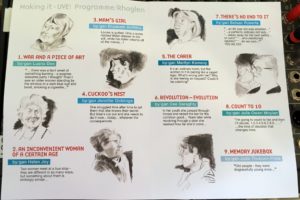
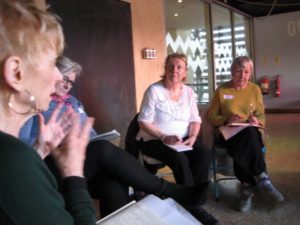
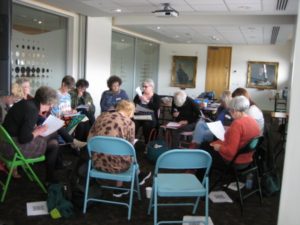

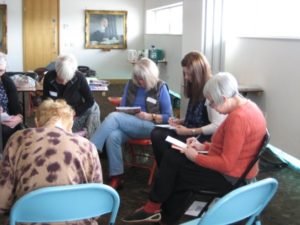
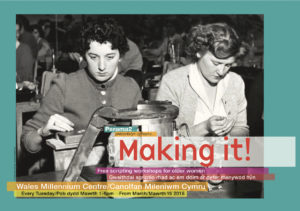



 (3 / 5)
(3 / 5)
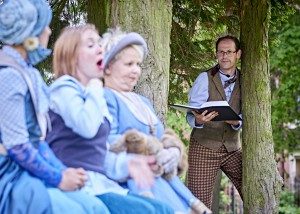


 (4 / 5)
(4 / 5)

